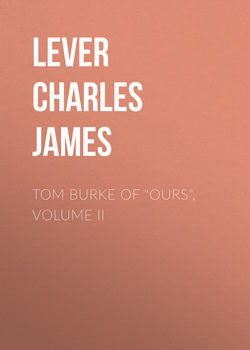Tom Burke Of "Ours", Volume II

Реклама. ООО «ЛитРес», ИНН: 7719571260.
Оглавление
Lever Charles James. Tom Burke Of "Ours", Volume II
CHAPTER I. THE SICK LEAVE
CHAPTER II. LINTZ
CHAPTER III. AUSTERLITZ
CHAPTER IV. THE FIELD AT MIDNIGHT
CHAPTER V. A MAÎTRE D’ARMES
CHAPTER VI. THE MILL ON THE HOLITSCH ROAD
CHAPTER VII. THE ARMISTICE
CHAPTER VIII. THE COMPAGNIE D’ELITE
CHAPTER IX. PARIS IN 1800
CHAPTER X. THE HÔTEL DE CLICHY
CHAPTER XI. A SALLE DE POLICE
CHAPTER XII. THE RETURN OF THE WOUNDED
CHAPTER XIII. THE CHEVALIER
CHAPTER XIV. A BOYISH REMINISCENCE
CHAPTER XV. A GOOD-BY
CHAPTER XVI. AN OLD FRIEND UNCHANGED
CHAPTER XVII. THE RUE DES CAPUCINES
CHAPTER XVIII. THE MOISSON d’OR
CHAPTER XIX. THE TWO SOIREES
CHAPTER XX. A SUDDEN DEPARTURE
CHAPTER XXI. THE SUMMIT OF THE LANDGRAFENBERG
CHAPTER XXII. L’HOMME ROUGE
CHAPTER XXII. JENA AND AUERSTÄDT
CHAPTER XXIV. A FRAGMENT OF A MAÎTRE d’ARMES EXPERIENCES
CHAPTER XXV. BERLIN AFTER “JENA.”
CHAPTER XXVI. A FOREST PATH
CHAPTER XXVII. A CHANCE MEETING
CHAPTER XXVIII. THE PENSION DE LA RUE MI-CARÊME
CHAPTER XXIX. MY NAMESAKE
CHAPTER XXX. AN OLD SAILOR OF THE EMPIRE
CHAPTER XXXI. A MOONLIGHT RECOGNITION
CHAPTER XXXII. THE FALAISE DE BIVILLE
CHAPTER XXXIII. THE LANDING
CHAPTER XXXIV. A CHARACTER OF OLD DUBLIN
CHAPTER XXXV. AN UNFORSEEN EVIL
CHAPTER XXXVI. THE PERIL AVERTED
CHAPTER XXXVII. HASTY RESOLUTION
CHAPTER XXXVIII. THE LAST CAMPAIGN
CHAPTER XXXIX. THE BRIDGE OF MONTEREAU
CHAPTER XL. FONTAINEBLEAU
CHAPTER XLI. THE CONCLUSION
A PARTING WORD
Отрывок из книги
As day was breaking, we came up with a strong detachment of the cavalry of the Guard proceeding to join Bessiere’s division at Lintz. From them we learned that the main body of the army was already far in advance, several entire corps having marched from Lintz with the supposed intention of occupying Vienna. Ney’s division, it was said, was also bearing down from the Tyrol; Davoust and Mortier were advancing by the left bank of the Danube; whilst Lannes and Murat, with an overwhelming force of light troops, had pushed forward two days’ march in advance on their way to the capital. The fate of Ulm was already predicted for the Austrian city, and each day’s intelligence seemed to make it only the more inevitable. Meanwhile the Emperor Francis had abandoned the capital, and retreated on Brunn, a fortified town in Moravia, there to await the arrival of his ally, Alexander, hourly expected from Berlin.
On the evening of the 13th of November we arrived at Lintz, the capital of Upper Austria, but at the time I speak of one vast barrack. Thirty-eight thousand troops of all arms were within its walls; not subject to the rigid discipline and regular command of a garrison town, but bivouacking in the open streets and squares. Tables were spread in the thoroughfares, at which the divisions as they arrived took their places, and after refreshing themselves, moved on to make way for others. The great churches were strewn with forage, and filled with the horses of the cavalry; there might be seen the lumbering steeds of the cuirassier, eating their corn from the richly-carved box of a confessional; here lay the travel-stained figure of a dragoon, stretched asleep across the steps of the altar. The little chapelries, where the foot of the penitent awoke no echo as it passed, now rung with the coarse jest and reckless ribaldry of the soldiers; parties caroused in the little sacristies; and the rude chorus of a drinking song now vibrated through the groined roof where only the sacred notes of the organ had been heard to peal. The Hôtel de Ville was the quartier-général, where the generals of divisions were assembled, and from which the orderlies rode forth at every moment with despatches. The one cry, “Forward!” was heard everywhere. They who before had claimed leave for slight wounds or illness, were now seen among their comrades with bandaged arms and patched faces, eager to press on. Many whose regiments were in advance became incorporated for the time with other corps; and dismounted dragoons were often to be met with, marching with the infantry and mounting guard in turn. Everything bespoke haste. The regiments which arrived at night frequently moved off before day broke. The cavalry often were provided with fresh horses to press forward, leaving their own for the corps that were to follow. A great flotilla, provided with all the necessaries for an army on the march, moved along the Danube, and accompanied the troops each day. In a word, every expedient was practised which could hasten the movement of the army; justifying the remark so often repeated among the soldiers at the time, “Le Petit Caporal makes more use of our legs than our bayonets in this campaign.”
.....
“Me voici!” said a silvery voice I knew at once to be hers. And the same instant she pierced the crowd around the bed, and approached the patient. No sooner had she beheld the features of the sick man than she reeled back, and grasped the arms of the persons on either side. For a few seconds she stood, with her hands pressed upon her face, and when she withdrew them, her features were almost ghastly in their hue, while, with a great effort over her emotion, she said, in a low voice, “Can he recover?”
“Yes, Minette!” replied the surgeon, “and will, if care avail anything. Just hear me for a moment.”
.....